Camper FAQs is reader-supported. Buying through links on our site may earn us an affiliate commission. As an Amazon Associate I earn from qualifying purchases.
Keeping an RV fridge cold while driving can be challenging, especially if you choose not to run it. But it’s definitely doable!
Below we look at whether you can safely run your fridge while driving and tips to keep it nice and cold if you keep it turned off.
Can You Run an RV Fridge While Driving?
Yes, you can run your RV fridge while driving. Most RV refrigerators are designed to run on either 120-volt AC power, 12-volt DC power, propane, or a combination of the three. Here’s how each option works:
- 120-volt AC Power: This is typically used when plugged into a campground or other shore power. However, some RVs are equipped with an inverter that can convert 12-volt DC power from your RV’s batteries into 120-volt AC power, which can then be used to power your fridge while driving.
- 12-volt DC Power: Some RV fridges can run directly off your RV’s 12-volt DC power system. This is often used while driving, as your RV’s alternator will keep the batteries charged. If you have a towable RV, keep the battery charged while driving through your vehicle’s alternator with a 7-pin travel trailer plug.
- Propane: Many RV fridges can also run on propane, which is an option for keeping your fridge cold while driving, especially if your RV doesn’t have an inverter or a 12-volt capable fridge (for example, a two-way fridge). And yes, you can legally run your RV fridge on propane while driving.
However, there are a few safety considerations to keep in mind:
- Propane Safety: If you choose to run your fridge on propane while driving, you’ll need to remember to turn the fridge off when refueling to prevent a potential fire. Also, some tunnels and ferries have restrictions on propane use, so you’ll need to turn off your propane in these situations as well.
- Battery Drain: If you’re running your RV fridge off the battery while driving, be aware that if you stop it can drain your batteries if your engine isn’t running and charging them.
- Level Operation: RV fridges, especially those that run on propane, must be relatively level to operate efficiently. While this is usually not a problem while driving on level roads, it can be an issue if you park on a slope.
Tip: Always refer to your refrigerator’s and RV’s manuals for specific instructions and safety guidelines.
Tips to Keep Your RV Fridge Cold While Driving
If you choose not to power your fridge while driving, there are several strategies you can use to keep your perishable items cool and safe. Here are some expert tips to help you maintain a cold temperature in your RV fridge while traveling.
1. Start Cold
Before you hit the road, make sure your fridge is already cold. This might mean turning it on the night before your departure or a few hours before you leave if it’s particularly efficient. Starting with a cold fridge means it will take longer for the temperature to rise.
2. Use Ice Packs or Frozen Items
Another effective strategy is to use ice packs or frozen items to help maintain a low temperature in your fridge. Try freezing drinks or other items that can thaw slowly over time, providing a consistent cooling effect. Learn how to properly pack an RV refrigerator for more tips to improve cooling efficiency and food safety.
3. Limit Opening the Fridge
When you open the fridge door, warm air enters, and cold air escapes. This can cause the temperature inside the fridge to rise quickly. To prevent this, limit the number of times you open the fridge. Plan your meals and snacks in advance, and try to remove everything you need at once to minimize the amount of time the door is open.
Also, check out our tips on how to keep your RV fridge doors closed while traveling if they are prone to popping open.
4. Use Fridge Fans
Fridge fans are small, battery-operated devices that can help circulate the cold air inside your absorption fridge, helping to maintain a consistent temperature. These fans can be particularly useful in larger fridges, where cold air might not reach all areas as effectively. They’re a small investment that can make a big difference in keeping your fridge cold and preventing frost build-up.
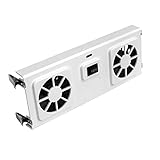
Quick Products Clip-On RV Refrigerator Fan
Price:Clicking this link to make a purchase may earn us a commission at no additional cost to you.
5. Park in the Shade Whenever You Stop
When you stop for a break, try to park your RV in the shade. Direct sunlight can heap your RV, including your fridge. By parking in the shade, you can help keep your entire RV and your fridge cooler.
6. Use Propane During Stops to Cool It Down
If you’re stopping for a while, consider running your fridge on propane to cool it down. This can be a quick and effective way to lower the temperature in your fridge, especially if it has risen during your drive.
Important: Remember to follow all safety guidelines when using propane.
7. Monitor the Fridge Temp to Ensure It Stays Within the Safe Range
Finally, it’s important to monitor the temperature inside your fridge regularly. According to the USDA, perishable food should never be at room temperature for more than 2 hours. Invest in a fridge thermometer and ensure your food is stored safely at all times. Some thermometers even feature an alarm to alert you if the temperature hits a certain point.

AcuRite Digital Wireless Fridge and Freezer Thermometer with Alarm
Price:Clicking this link to make a purchase may earn us a commission at no additional cost to you.
If the temperature rises, you can take steps to cool it down, such as using more ice packs or running the fridge on propane, for example.
Tip: See RV fridge is running but not cooling if you’re having trouble keeping it cold while the power is on.

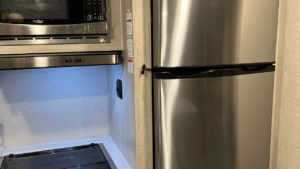
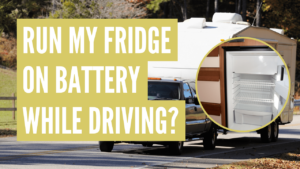
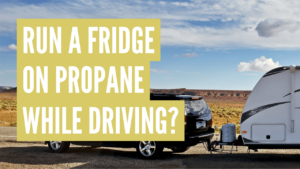
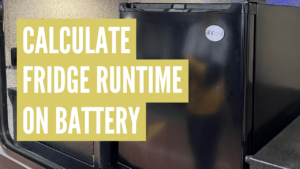

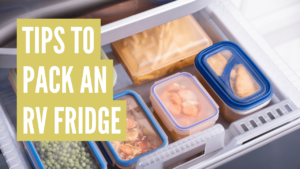
You failed to mention solar panels keeping the battery charged! And the refrigerator running off the battery. I have this set up.